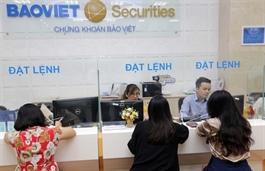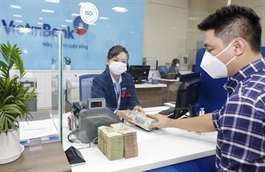The barriers associated with market status upgrade
The barriers associated with market status upgrade
As Vietnam’s stock market stands poised on the threshold of significant upgrades, there is an air of anticipation among experts and investors alike. Such a move would send positive signals, heralding both increased market liquidity and foreign investor participation, while also driving greater transparency in the marketplace.

Currently, there are two critical issues associated with Vietnam’s stock market upgrade.
The first challenge revolves around pre-funding transactions. Circular No.120/2020/TT-BTC from the end of 2020, on transaction of listed shares on the securities trading system, stipulates that foreign investors must ensure a 100 per cent fund balance in their accounts before transacting.
If the investors’ banks act as custodians and the necessary funds are absent, then these custodian banks must vouch for and guarantee the transaction’s completion.
This is complicated by the fact that the State Bank of Vietnam does not allow these custodian banks to extend credit to foreign investors for stock acquisitions. Thus, these investors are bound by the need to maintain a full balance in their accounts, potentially missing out on lucrative investment avenues or facing unwarranted charges even for failed trades.
While there are whispers about potential short-term remedies, such as tweaking Circular 120 to remove the pre-funding prerequisite or the State Securities Commission (SSC) contemplating the offering of margins based on an investor’s collateral, the longer-term vision might be to look at adopting a counter-payment partnership model. Such a model would facilitate custodian clients to double up as counter-party members.
The second pivotal aspect that warrants discussion is the cap on foreign ownership.
The government’s Decree No.31/2021/ND-CP from March 2021 elaborates on the Law on Investment by placing the upper limit of foreign ownership for unrestricted businesses at a commendable 100 per cent. Yet, this ceiling varies for distinct sectors. For instance, the banking arena sees a limit set at 30 per cent.
What’s intriguing is that while businesses can autonomously determine their specific foreign ownership limits, many choose to pitch it lower than the permissible cap. Multiple banks, for example, opt for a cap under 30 per cent, keeping a reserve for potential strategic alliances down the line.
Furthermore, industries like retail often settle for a 49 per cent threshold, as foreign-funded retail establishments grapple with unique challenges when pitted against domestic entities. A potential long-term solution might entail revising these ownership caps to their maximal levels.
Taking inspiration from our neighbours, we could also ponder over the introduction of non-voting depositary receipts, akin to the model that Thailand has successfully adopted.
With the unwavering commitment of the SSC and its affiliated bodies, I am buoyed by the prospect that these hurdles will soon be surmounted. The path to elevating our standing in the FTSE Russell looks promising, while earning a niche in the MSCI system might demand a touch more patience and persistence given its stringent criteria.
On the other hand, the ripple effects of such an upgrade cannot be understated, both quantitatively, in terms of market liquidity and foreign investment, and qualitatively, in ensuring a more transparent marketplace.
Historically, the transition from a frontier to an emerging market takes approximately three years, with three significant milestones: the upgrade proposal, the official announcement a year later, and the actual upgrade another year after that.
One year before the proposal, the average market price-to-earnings ratio valuation typically expands by 10-15 per cent.
From the proposal to the announcement, the ratio continues to grow, but at a slower pace. Post-announcement, the market tends to stabilise.
Notably, individual companies within the primary index often see a more substantial ratio expansion, averaging about 35 per cent throughout the process.
























